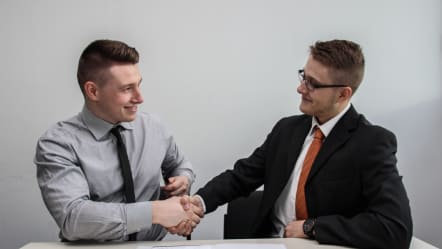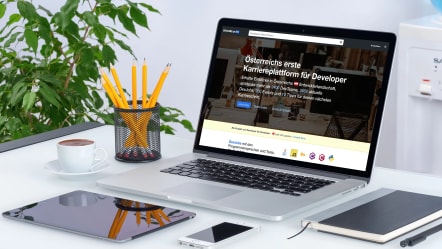How to talk about weaknesses in a it job interview

With a little preparation, you can make talking about weaknesses the strongest part of your interview.
Job interviews can be nerve-wracking. You're alone, sitting across a stranger that judges you and decides about your potential new workplace.
It's no wonder you're struggling to answer when asked about your weaknesses - you want to present yourself as a competent potential employee.
Examples for weaknesses in a job interview:
- lack of organisational skills
- impatience
- Not being able to take constructive feedback
- Can't communicate challenges or ideas
- Inexperience with certain technologies or abilities
- Not wanting to take risks or challenge oneself
- Rob J., Senior Director of Engineering at data intelligence company Collibra, appreciates the insight a candidate's reflection on their own weaknesses can provide, but he usually phrases the question differently.
„The wording matters a lot,“ said Rob. „I often say, 'Tell me about a challenging situation where you might have made a mistake. What are your personal challenges?'“
Focusing on challenges rather than weaknesses makes it easier for people to open up and share. Still, it can be tough. Rob estimates that even among experienced candidates, often reserved answers are given. Rob shares his mistakes with the candidates to show what type of responses he is looking for and to create an environment where it is okay to admit weaknesses.
One story he often shares is about a mistake he made a gas company that almost turned off the central heating for half a million people in Chicago. This experience taught Rob that it's always best to think things through before taking on a task with such potential consequences.
It's important to know how to speak truthfully about your weaknesses in a job interview, because HR managers value employees who are aware of themselves and take ownership of their mistakes. It can also be an opportunity to describe how you've grown as a professional and made progress. Plus, it's not as scary as you think, as long as you're prepared.
Tips for talking about your weaknesses in a job interview:
AVOID UNTRUTHFUL ANSWERS
There is no right answer, but there are some bad ones. To start, it's probably best to avoid thinking that your weaknesses are also your strengths.
"I'm a little suspicious of people who give disingenuous answers like 'My biggest problem is that I care too much or work too hard' - I don't aspire to that," said Rob. "Are you trying to say you're perfect and have never made a mistake? I want to know how you learn from mistakes, because mistakes help you grow."
We are interested in everything you have to say - familiarity with technologies, struggles with certain business processes, difficulties adapting to the way certain teams are structured and the resulting team dynamics.
Rob said that there is usually a difference in what speaks to candidates depending on their level of experience. For example, junior developers tend to talk about languages and programming frameworks that they are not familiar with, while more experienced developers may go into more detail about technical problems they are having or work processes that need improvement.
Prepare for questions about your weaknesses and challenges before your interview. It can be helpful to look back on your professional experience and think about aspects of the job that were particularly challenging. Rob said it might be a good idea to do this on a regular basis, regardless of whether or not a job interview is pending. This can reduce the preparation burden at the given time, especially for experienced people.
Having a lot of experience doesn't mean you're always prepared. You need to look back on your past, reflect on what you did well and what you could have done better. This way, you can be prepared for anything that comes your way.
Talk about your personal growth!
It may seem counterintuitive to talk about your weaknesses in a job interview, but instead of opening up to criticism, it can actually have the opposite effect.
"Speaking to your boss honestly can make you appear more confident, if you're able to do it in the right way and use it as an opportunity to gauge mutual compatibility," said Alicia Gansley, senior engineer at Chainalysis, a startup that helps businesses and regulators track blockchain activity.
Noone is born knowing the answer to every question. Bosses account for peoples mistakes and therefore expect them. That is how you learn and grow.
Being honest about your weaknesses shows that you're a candid person who is willing to work on improving yourself.
Companies can interpret the inability to speak about weaknesses as a lack of curiosity and interest in improvements. Employees who do not seek out opportunities for feedback will simply not find any problems, and this can inhibit their growth and future contributions to the company. Speaking honestly about weaknesses signals to employers that you take feedback seriously.
If done well, it can also give candidates the opportunity to demonstrate improvements and insights. A good way is to highlight any insights and learnings you have gained from your previous shortcomings.
"If you don't learn from your mistakes, it's just a waste," said Rob.
He gave the example of a developer who, after an argument, conceded to a product manager's feature decisions and realized that he was in the wrong for pushing for a solution that wasn't customer-oriented enough. It is important for companies to value the self-confidence of their employees.
"I like a scientific work environment where the goal is to solve the problem," Rob said. "It's OK to make mistakes - people make mistakes. If you made a mistake in your experiment, just let us know so we can make progress in delivering our software."
Underline your ability to work in a team!
Companies also like to ask questions about challenges and weaknesses to assess whether candidates can interact with others and would contribute to the team environment.
„Good relationships and communication are key for engineers, despite the stereotype of the geeky engineer sitting in a cave,“ said Rob. „They need to be able to work with interest groups and often give presentations to customers—we need engineers who can communicate.“
"I like self-confidence because it means they're going to be a great contributor to the team and be humble and willing to move things forward."
Communication is the key to being effective, especially when it comes to overcoming difficult situations that you have caused yourself. But admitting mistakes and weaknesses is the first step. Employees who are willing to admit when they are wrong can derail a project by wasting their team's time arguing about unworkable solutions.
It is especially important to have employees who are open and honest with each other in a startup environment, Gansley said. Many startups lack the structure of established companies and instead rely on individual contributors who take the initiative in identifying, prioritizing, and executing tasks. Being successful in such an environment requires transparent and effective communication. „At a startup, you'll wear many hats and have high expectations,“ said Gansley. „If you can start that trust in the interview process and carry it into your actual role working with the team, it can look really good for a candidate.“
Being open about your weaknesses can also bring unexpected benefits to the candidate themselves.
„The manager may feel that the weakness you're mentioning is something he has also worked on,“ said Gansley. „Perhaps they will find the best coach for themselves by openly addressing their weaknesses during the job interview.“
Ask about the companies challenges as well!
It is better to imagine questions about weaknesses in a way that does not have "right" or "wrong" answers - companies are not trying to find the candidate who is smart enough to come up with the best answer. In the end, these questions are about assessing compatibility between the candidate and the company.
„If you really hate processes and every time someone says, 'Well, have you asked the architect because he has to sign off your code' - if you hate that, it's not necessarily a weakness,“ said Rob. „It just means that you might be more suited for a startup company that doesn't have any processes - we have some processes now because we're growing.“
It is also important that the candidate asks questions about the challenges the company faces. Candidates who value certain qualities in a work environment should ask about the challenges the company faces on a daily basis and what the work style is like to find out if the company is right for them.
Rob said that he especially expects this from experienced candidates who have worked in a variety of companies and know where they are successful. Some candidates, for example, value creativity and may not do well in an environment where the only focus is on churning out user stories one after the other, rather than giving employees room for innovation.
"I want them to try to understand what they're getting into," said Rob. "I think it really comes down to finding a match. It's two-way. You start to build a functioning relationship, and that's your best shot at trying to have some balance, be a little vulnerable, and see if you're comfortable and fit together."



